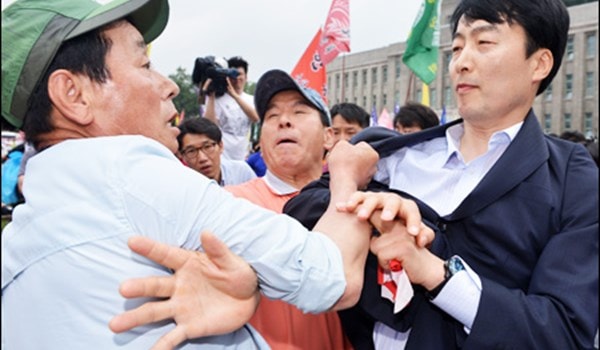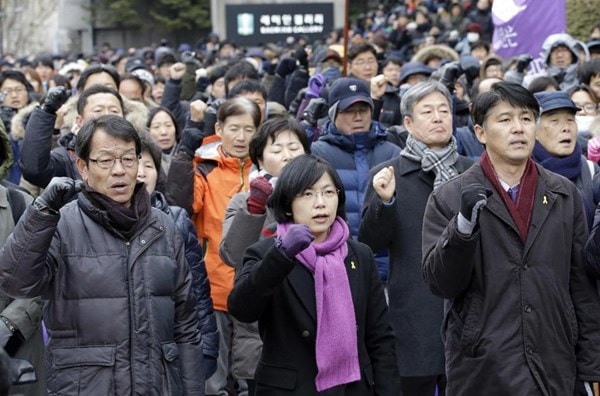Support for North Korea, South Korean left-wing party dissolved
On December 19, the Constitutional Court dissolved the left-wing United Progressive Party (UPP), because it was found guilty of plotting a rebellion and supporting North Korea. The UPP was also banned from forming a rival party.
 |
| Congressman Lee was beaten by Korean people |
This is the first time a political party has been dissolved since the Constitutional Court (TAHP) was established in 1988.
TAHP has 9 judges, 9 voted in favor of dissolving UPP, only 1 voted against. The rule is that to dissolve a political party, it must have 6 votes in favor of 9 judges.
The UPP currently holds five seats in the 300-seat South Korean National Assembly, and the TAHP also stripped the five party members of their parliamentary rights.
Under the South Korean Constitution, the government can ask the TAHP to consider dissolving a political party that violates the “basic order of democracy.”
In November 2013, the South Korean Ministry of Justice submitted a proposal to dissolve the UPP to the TAHP, citing the arrest of several UPP members who were rebelling, plotting rebellion, and supporting North Korea.
The ministry also accused the UPP of supporting a North Korean-style socialist system and posing a threat to South Korea's liberal democracy.
Several UPP members, including lawmaker Lee Seok-ki, were accused of plotting with the Revolutionary Organization to overthrow the government if war broke out between South Korea and North Korea.
The sedition charge carried a maximum sentence of nine years in prison for seven UPP members.
Congressman Lee is awaiting his appeal to the Supreme Court. At the 2013 UPP congress, he reportedly called for attacks on sensitive locations if war broke out between North and South Korea.
Lee has pleaded innocent, saying his statement was misinterpreted. But Justice Minister Hwang Kyo-ahn said the UPP is a sympathizer of North Korea and pursues Pyongyang's strategy of revolutionizing South Korea.
The UPP was established in late 2011, claiming to represent the working class and progressive classes of Korean society.
The UPP said it only wanted stronger reconciliation efforts with North Korea, and accused the National Intelligence Service (NIS) of fabricating the "rebellion" charge to divert public attention from the NIS's covert campaign to help Park Geun-hee win the presidential election in December 2012.
The verdict "opens the gates to totalitarianism"
UPP leader Lee Jung-hee said the ruling was TAHP's way of “opening the gate to totalitarianism based on lies and imagination, and turning South Korea into a dictatorship.”
 |
| UPP leader Lee goes to protest |
The TAHP ruling has prompted critics to say it restricts freedom of speech in a country that once lived under a military dictatorship.
In the late 1980s, South Korea transitioned to democracy, after decades of military dictatorship.
In the past, authoritarian leaders like President Park Chung-hee (father of President Park) often dissolved parliaments, political parties and banned party activities to suppress their opponents.
Opponents of Ms. Park say her style of governance is similar to that of her father: Mr. Park led South Korea for 18 years until his assassination in 1979.
The ruling will further exacerbate political divisions between the left and right.
Much of the division in South Korea is over views of North Korea. After the 1950-53 civil war, South Korea and North Korea share the world's most heavily armed border.
According to AP, in South Korea, praising North Korea can result in a seven-year prison sentence.
According to motthegioi.vn






